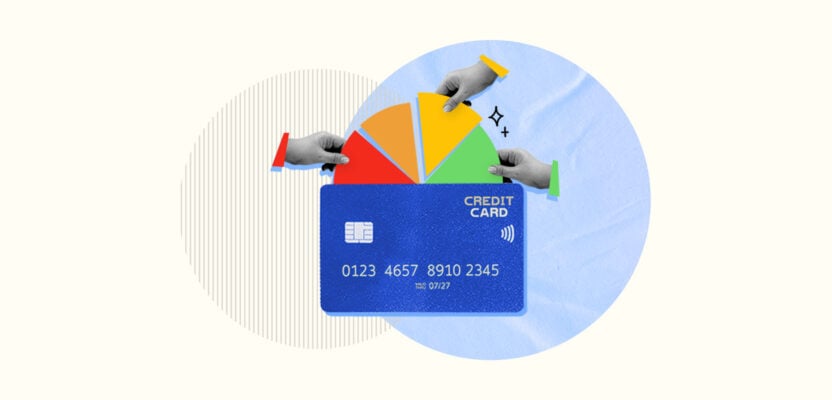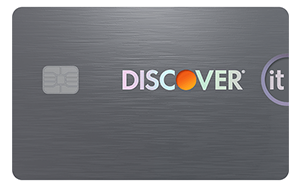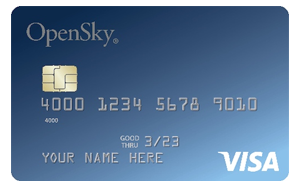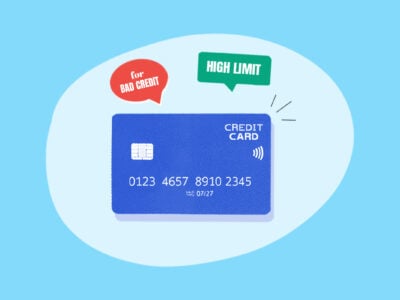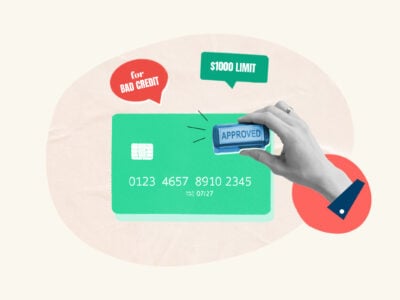Credit Cards for Building Credit
| Credit Card | Best For | Credit Score | Annual Fee | Welcome Bonus | |
|---|---|---|---|---|---|
| Overall | 300–669 | $0 | Cashback Match | ||
| Unsecured (No Deposit) | 300–669 | $39 ($0 for the first year if you set up autopay) | |||
| Secured | 300–669 | $0 | |||
| No Annual Fee | 580–739 | $0 | |||
| Easy to Get | 300–669 | $35 | |||
| Students | 580–739 | $0 | Cashback match | ||
| No SSN Requirement | 300–669 | $0 | |||
Table of Contents
Using credit cards to build credit is a tried-and-true way to establish a borrowing history. Without credit, you may struggle to secure loans or score some jobs and housing. However, credit cards vary widely, and which ones you can get depends on your credit history.
This can make building credit tricky, as new borrowers only qualify for a small number of credit cards. Luckily, there are options out there, you just need to find the right one for you. To build credit with a credit card, look for options that report to the three major credit bureaus, as credit reporting is one of the fastest ways to establish your borrowing history.
What makes a credit card good for credit building beyond that will depend on your borrowing needs, including whether you can afford a credit card security deposit or want to earn cashback rewards. To start your search, check out our top picks for the best credit cards for building credit.
Best credit cards for building credit
Below are the top credit cards you can use to build credit.
Best overall credit card to build credit
Discover it® Secured Credit Card
Rating Breakdown
Fees
4.9No annual fee and no foreign transaction fees score this card a high rating in the fees department.
APR
2.7Carrying a balance could get costly on this card, given the high purchase APR.
Rewards
4.4Considering it’s a secured card, the Discover it® Secured offers impressive rewards and even a cashback welcome bonus.
Credit Reporting
5.0Discover reports to the major credit bureaus, which can help you build your credit.
Security Deposit
4.0The minimum and maximum security deposit allow a good range of flexibility for you to determine your credit limit.
Other
We adjusted for factors like free credit scores and a fully refundable security deposit.
|
Annual
Fee
$0 |
Credit
Score
300–669 |
|
Deposit
$200–$2,500 |
Purchase
APR
25.99% (variable) |
Rewards
-
Welcome Bonus
Cashback Match earns you a dollar-for-dollar match on your first-year rewards
-
Gas & Restaurants
2% cash back up to $1,000 in combined spending each quarter
-
Everything Else
1% cash back on all eligible purchases
Why It's Great
Our top choice of credit-building credit cards is easily the Discover it® Secured credit card. As a secured card, it requires a security deposit that will equal your initial credit limit. However, the deposit can be as little as $200 and is fully refundable when you cancel your account or upgrade to an unsecured card.
What makes the Discover it® Secured credit card so desirable is that it offers cashback rewards—an extreme rarity among credit cards for no credit. Here’s how the rewards work:
- 2% cash back on gas and restaurant purchases (up to $1,000 each quarter)
- 1% cash back on all other purchases (unlimited)
- 1-for-1 cashback match in your first 12 months (every dollar you earn in cash back will be doubled in your first year of card ownership)
In addition to the generous rewards program, there’s no annual fee or foreign transaction fees. What’s more, you get a free monthly FICO score, so you can track your credit-building progress.
Pros & Cons
Pros
- No annual fee
- 2% cash back on gas station and restaurants
- 1% cash back on all other purchases
- Dollar-for-dollar cashback match after 12 months
- Free monthly access to FICO score
Cons
- High annual percentage rate (APR)
- Maximum deposit of $2500
- Rewards rates cap out at $1000 per quarter
- High penalty fees
Best unsecured credit card to build credit
Prosper® Card
Rating Breakdown
Fees
4.8Compared to other unsecured cards for less-than-perfect credit, the Prosper® Card offers more bang for your buck, with a relatively low annual fee and no cash advance fees.
APR
1.8The Prosper® Card comes with a pretty broad APR range, and there’s a good chance you’ll end up with a high interest rate.
Rewards
1.0Because the Prosper® Card doesn’t offer any credit card rewards, it earns the lowest possible score in the rewards category.
Credit Reporting
5.0The Prosper® Card issuer reports activity to the three major credit bureaus.
Credit Limit
4.5Generous credit limits and a willingness to offer credit line increases very soon after account opening earn this card a high rating in this category.
Other
We adjusted the rating for additional factors like the lack of a security deposit and the short time period before cardholders are eligible for credit line increases.
|
Annual
Fee
$39 ($0 for the first year if you set up autopay) |
Credit
Score
300–669 |
|
Purchase
APR
22.74%–33.74% (variable) |
Credit
Limit
$500–$3,000 |
Why It's Great
For borrowers who want to establish credit but aren’t eager to put down a security deposit, finding a good option can be difficult. Most unsecured credit cards for bad credit charge exorbitant fees and offer less-than-favorable borrowing terms.
The Prosper® Card, however, doesn’t require a deposit and offers fairly gracious borrowing terms. For one, your initial credit limit will be between $500–$3,000 and your account will be automatically reviewed for credit limit increases.
This gives borrowers a comparatively high amount of buying power, as most similar cards only offer credit limits of $200–$300.
On the downside, it comes with an annual fee up to $39. However, this fee will be waived in your first year if you set up autopay on your account.
Pros & Cons
Pros
- No deposit required
- No cash advance fees
- Fast application
- Credit limit increases available after 3 months
- Foreign transactions are available
Cons
- High APR
- $39 annual fee
- No rewards
- No welcome bonus or intro offers
- Balance transfers not available
Best secured credit card to build credit
Rating Breakdown
Fees
5.0The card boasts no annual fee, no foreign transaction fees, and standard fees for functions like cash advances.
APR
2.6The card has a relatively high purchase APR, making it expensive to carry a balance on.
Rewards
1.0Unfortunately, there are no cashback rewards on the Capital One® Platinum Secured.
Credit Reporting
5.0Capital One reports to the three major credit bureaus, making this card a good option for building credit.
Security Deposit
4.6This card has one of the best security deposit offers available, as you actually can put less money down then you get as a credit limit.
Other
We manually adjusted the card’s rating for factors like free credit scores and a fully refundable security deposit.
|
Annual
Fee
$0 |
Credit
Score
300–669 |
|
Deposit
$49–$200 |
Purchase
APR
26.49% (variable) |
Why It's Great
Building credit tends to come at a cost. Cards available to borrowers with bad credit, limited credit, or no credit at all, usually charge high fees and security deposits.
The Capital One Platinum Secured breaks the trend by providing an inexpensive option for building credit. Along with its credit reporting to the three major bureaus, the Capital One Platinum Secured offers:
- No annual fee
- No foreign transaction fees
- Flexible due dates
- A flexible security deposit
- Credit limit increases
- CreditWise, a virtual credit monitoring service
Secured credit cards usually match your initial credit limit to your security deposit. With the Capital One Platinum Secured, you can put down as little as $49 and still be offered a $200–$1,000 initial credit limit with potential for credit limit increases, making it a uniquely cheap secured card option.
Additionally, Capital One offers a variety of credit tracking perks, including free credit scores and comprehensive breakdowns of changes to your credit report.
Pros & Cons
Pros
- No annual fee
- Potential for increased credit limit after six months
- Credit monitoring
- Flexible deposit
Cons
- No rewards or sign-on bonuses
- High APR
Best no-annual-fee credit card for building credit
Deserve® PRO Mastercard®
|
Annual
Fee
$0 |
Credit
Score
580–739 |
|
Purchase
APR
19.74%–26.74% (variable) |
Rewards
-
Movies
3% cash back on entertainment purchases
-
Travel
3% cash back on travel purchases
-
Dining
2% cash back on purchases at restaurants
Why It's Great
The Deserve® PRO Mastercard is an unsecured credit card available to borrowers with no credit score whatsoever. It scores major points as it comes with no annual fee and cashback rewards.
The Deserve® PRO is an especially great card for foreign employees, as you can qualify without an SSN, as long as you’re gainfully employed in the US. Better yet, it doesn’t charge foreign transaction fees, making it a good resource for traveling abroad.
As far as rewards, it offers:
- 3% on travel (e.g., hotels, car rental, airlines, tourism, and general entertainment)
- 2% on restaurants
- 1% on everything else
However, there are relatively low caps each quarter, as you can only enjoy the 2%–3% cashback rate for up to $500 in spending. After that, the rewards rate will default to 1%.
Pros & Cons
Pros
- No deposit required
- No annual fee or foreign transaction fees
- 1%–3% cashback rewards
- Available to professionals with no credit score
Cons
- No balance transfers or cash advances
- Caps on cashback rewards
- No introductory APR offers
- No welcome bonuses
Easiest-to-get credit card to build credit
OpenSky® Secured Visa®
Rating Breakdown
Fees
4.6The OpenSky® Secured Visa® does well in the fees category thanks to the low annual fees.
APR
3.3The OpenSky® Secured Visa® has reasonable interest rates on purchases and cash advances, especially compared to other cards for this credit range.
Rewards
1.0Because this card doesn’t give you any returns for your spending, it gets the lowest possible score in the rewards category.
Credit Reporting
5.0The OpenSky® Secured Visa® reports to all three credit bureaus, so it gets top marks for credit reporting.
Security Deposit
4.0The OpenSky® Secured Visa® allows you to put down as little as $200 or as much as $3,000, so there’s a reasonable amount of flexibility about how much security deposit you pay (and credit limit you get in return).
Other
We bumped up the score a bit for this card because of its good accessibility, since it has high approval odds and is available to borrowers with no credit history.
|
Annual
Fee
$35 |
Credit
Score
300–669 |
|
Deposit
$200–$3,000 |
Purchase
APR
21.14% (variable) |
Why It's Great
While there’s no such thing as a 100% guaranteed approval credit card for bad credit, the OpenSky® Secured Visa® is about as close as you can get. If you’re worried about qualifying for a credit card because of insufficient credit history or negative marks on your credit report, this may be the one for you.
The OpenSky® Secured Visa® won’t perform a credit check (also called a hard pull or hard inquiry) when you apply for the card. Not only does this raise your chances of approval, but it will prevent your credit score from dropping a few points due to a hard inquiry.
Additionally, the OpenSky® credit card will report your borrowing activities to all three major bureaus and allow you to set your own due date, making on-time payments more easily manageable.
Pros & Cons
Pros
- Low APR
- No checking account required
- High approval odds
- Flexible due dates
Cons
- Requires a security deposit
- $35 annual fee
- Can’t upgrade to an unsecured card
- No rewards
Best student credit card to build credit
Discover it® Student Cash Back
|
Annual
Fee
$0 |
Credit
Score
580–739 |
|
Purchase
APR
15.99%–24.99% (variable) |
0% APR
Period
6 Months |
Rewards
-
Welcome Bonus
Cashback match earns you a dollar-for-dollar match on your first-year rewards
-
Rotating Category
5% cash back on select purchases each quarter (e.g., Amazon, grocery stores, restaurants, gas stations, and PayPal), up to the quarterly maximum
-
Everything Else
1% cash back on all other eligible purchases
Why It's Great
One of the best financial moves you can make is to build your credit early. One great way to achieve this is by getting a student credit card if you’re enrolled in a college or university. Building your credit while in school gives you a leg-up when you enter the working world. And what better way to build credit than with a highly lucrative rewards card.
Along with no annual fee or foreign transaction fees, the Discover it® Student Cash Back card offers the following rewards:
- 5% cash back on rotating categories (e.g., groceries, gas, dining) up to $1,500 each quarter
- Unlimited 1% cash back on all other purchases
- 1-for-1 cashback match in the first year
Keep in mind that you’ll need to sign up for the quarterly bonus cashback categories, so making the most out of this credit card requires some diligence.
Pros & Cons
Pros
- No annual fee
- No foreign transaction fees
- Cashback rewards
- Cashback bonuses in the first year
- Introductory offers on APRs and fees
- No fee for first late payment
Cons
- May need cosigner to qualify
- Complicated bonus rewards
- Limited acceptance abroad
Best credit card to build credit without an SSN
Petal 2 "Cash Back, No Fees" Visa®
Rating Breakdown
Fees
4.7Because the Petal 2 Visa® stays true to its “no fees” name, it scores very highly in this category.
APR
2.2The Petal 2 Visa® has a wide range of interest rates, and less creditworthy borrowers could be hit with high APR.
Rewards
2.5This card has a fairly complicated rewards program, although it’s still one that’s worth having.
Credit Reporting
5.0Petal cards report to all three of the major credit bureaus, so the Petal 2 Visa® ticks all the boxes for building credit.
Credit Limit
5.0The Petal 2 Visa® gives you a credit line of up to $10,000, which is very generous.
Other
We gave the Petal 2 Visa® extra credit for its accessibility, since it accepts applicants with no credit score and applicants without a Social Security number.
|
Annual
Fee
$0 |
Credit
Score
300–669 |
|
Purchase
APR
15.99%–29.99% (variable) |
Rewards
-
All Purchases
1%–1.5% cash back on all eligible purchases (your rate increases to 1.25% after 6 on-time payments, 1.5% after 12 on-time payments)
Why It's Great
Whether or not you’re a US citizen, the Petal® 2 credit card is a great credit card for building your credit. However, if you’re an international worker or otherwise non-citizen, this is an especially appealing option, as you don’t need a Social Security number (SSN) to apply.
The Petal® 2 offers a unique combination of no fees and cashback rewards. It doesn’t charge annual, monthly, late, or foreign transaction fees, and it offers the following rewards:
- 1% cash back on all of your purchases
- 25% cash back on all purchases after 6 on-time monthly payments
- 5% cash back on all purchases after 12 on-time monthly payments
- 2%–10% cash back on purchases made with select merchants
These generous perks make the card a lucrative option for new borrowers, and a great source of credit building as payments are reported to the three major bureaus.
However, not everyone will be approved for the Petal® 2. When you apply, you first go through a Petal® credit card pre-approval process, which will determine whether you’re eligible for the Petal® 2, Petal® 1, both cards, or neither card.
Pros & Cons
Pros
- No annual fee
- No foreign transaction fees
- No late payment fees
- Cashback rewards
- Available to people with no SSN
Cons
- Complicated rewards
- Potentially high APR
- No introductory APR
- No balance transfers or cash advances
Do credit cards really build credit?
Yes, credit cards really build credit. If your credit card issuer reports your borrowing activities to the credit bureaus (the major three are Equifax, Experience, and TransUnion), that information will be used to update your credit report. Your credit report is what lenders use to check your credit.
Using a credit card regularly and responsibly—meaning you don’t borrow too much and you always pay your bills on time—is an effective way to build credit. How dramatically your credit changes will depend on where it started. For example, someone with no credit history or a bad score might see big changes in credit score after they start using a credit card versus someone with a well-established credit history.
Which credit cards can I use to build credit?
You can use any credit card to build credit, including secured and unsecured cards. The most important feature to look for in a credit card for building credit is credit reporting. (That is, whether or not your credit card issuer reports your payments to any credit bureaus.)
Credit reporting is not legally required of lenders, but many still report your monthly borrowing activities to one or more of the major credit bureaus. For your credit card to be used to build credit, you need to ensure your lender reports. To find out whether a lender reports to the credit bureaus:
- Check their website
- Check the card’s rates and fees page
- Check the card’s terms and conditions
- Call the issuer directly and ask
How do I build credit with a credit card?
To build credit with a credit card, follow these steps:
1. Choose the right card: Do your research ahead of time and only apply for a credit card you’re confident you can qualify for. Otherwise, you risk getting hard inquiries on your credit report for no reason. Hard inquiries are when a lender checks your credit history, an act that knocks a few points off your credit score.
2. Pay your bills on time: The most important thing to do when building credit is always pay your bills on time. Failing to pay your credit card bill could result in fees, penalty APR, and credit score damage. On the other hand, paying your bills in full and on time will likely improve your credit history.
3. Don’t borrow too much credit: One factor in your credit score is your credit utilization rate. This number represents how much credit you’re borrowing at any given time. Borrowing too much of your available credit will look bad, so try to limit how much you borrow each month.
4. Keep your credit accounts open: When finding the right card to build credit with, choose one that you can see yourself using for a long time. Try not to open a card thinking you’ll just close it in a year or two, as closing credit cards can hurt your credit score.
How we rate our credit cards
Finding the right credit card when you don't have established credit is tough. That's why we heavily weighted the following factors when determining the best credit cards to build credit:
- Qualification requirements
- Fees
- Interest rates
- Security deposits
- Rewards and bonuses
- Borrowing terms
These factors, among many others, are part of our 5-star credit card rating methodology for all card categories. Our star ratings are unbiased and independent of our affiliates and advertisers.
